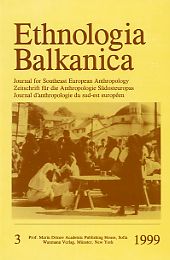Die Zagóri-Dörfer in Nordgriechenland: Wirtschaftliche Einheit – ethnische Vielfalt
The Zagóri Villages in Northern Greece: Economic Unity – Ethnic Diversity
Author(s): Thede KahlSubject(s): Customs / Folklore
Published by: LIT Verlag
Summary/Abstract: The approximately 48 Zagóri villages in the northwestern Greek district of Epirus experienced in the period 1684–1868 a considerable economic progress thanks to their privileged special situation as an independent league within the Ottoman Empire and to the wealth of the emigrated Zagorians. The Zagóri villages illustrate how prosperity can let ethnic differences appear less important and can lead to the formation of a new regional identity. The common „romaic“ Christian-orthodox identity together with a deep feeling of belonging to the region of Zagóri made the Zagorians become a unity regardless of their linguistic, cultural and socioprofessional origin. The coexistence and blending of the ethnic groups emerged in a dynamic symbiosis. This symbiosis, their permanent contact with foreign countries and their rapid intellectual development made Zagóri the most prosperous pro-urban region of Epirus for a period of nearly 200 years. The analysis of the ethnic structure of the Zagóri villages during the existence of their league shows that each ethnic group had its own professional specialization. Thanks to the economic progress only a small part of the population had still to earn their living with agriculture and cattle breeding. The Greek Zagorians who had emigrated abroad achieved their wealth mainly by trading. Shortly afterwards they were followed by the Aromanian Zagorians, who as well achieved their wealth abroad, but mostly by doing transport. The decrease in population caused by emigration was filled by Arvanites (Greek-orthodox Albanians) who helped out with different jobs in the villages in some of which there were only few male inhabitants left, and quickly integrated into the population they found there. The technical professions and music were monopolized by Gypsies (Roma). The nomadic Greek-speaking Sarakatsans remained nearly completely outside of the Zagorian society. It was only in the 20th century that they became settled and could fill the decrease in population caused by the latest waves of emigration.
Journal: Ethnologia Balkanica
- Issue Year: 1999
- Issue No: 03
- Page Range: 103-119
- Page Count: 17
- Language: German
- Content File-PDF

